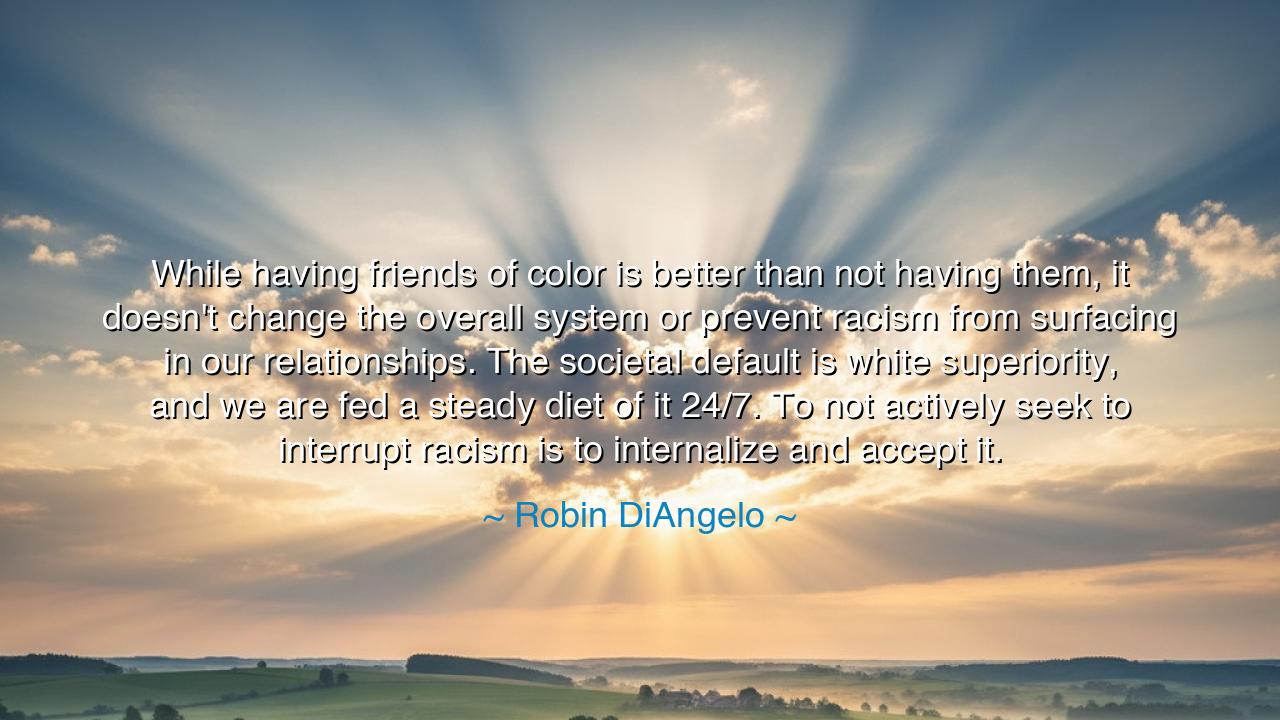
While having friends of color is better than not having them, it
While having friends of color is better than not having them, it doesn't change the overall system or prevent racism from surfacing in our relationships. The societal default is white superiority, and we are fed a steady diet of it 24/7. To not actively seek to interrupt racism is to internalize and accept it.






In the words of Robin DiAngelo, “While having friends of color is better than not having them, it doesn't change the overall system or prevent racism from surfacing in our relationships. The societal default is white superiority, and we are fed a steady diet of it 24/7. To not actively seek to interrupt racism is to internalize and accept it.” This saying, though born in modern times, carries the gravity of ancient truth — a truth that humanity has wrestled with through every age: that the evils of injustice are not undone by sentiment alone, but by conscious action, by vigilance, and by courage of the heart. It is not enough to possess kindness in the soul; one must awaken the will to challenge what is unjust in the world.
DiAngelo’s words speak of a system, invisible yet all-pervading, like a mist that seeps into every breath. She warns that racism is not only the cruelty of individuals but the quiet pattern that shapes the air we live in. Just as the ancients spoke of fate — unseen yet binding — so too is the power of social conditioning: a whisper repeated until it becomes law, a story told so long it feels like truth. To say that the “societal default is white superiority” is to unveil the ancient deceit of hierarchy — the lie that one skin, one heritage, one people, are set above the rest by destiny itself. It is a false god that demands silent worship. And silence, she says, is its nourishment.
The ancients knew this too. In the days of Rome, the philosopher Seneca wrote of slavery, a system so entrenched that few questioned it. “They are slaves,” he said, “but they are men.” In these words, he began to see the cracks in the empire’s moral stone. Yet for centuries, the system remained, because too many who knew it was wrong said nothing. They dined with slaves, spoke kindly to them, even called them “friends” — but friendship did not end the chains. Likewise, DiAngelo’s insight reminds us that personal goodwill, though noble, cannot alone dismantle the pillars of a great injustice. To be kind is not the same as to be just.
She teaches that to “not actively seek to interrupt racism is to internalize and accept it.” In these words lies a call to arms — not with weapons of steel, but with weapons of conscience. For every person who stands by quietly as prejudice festers becomes, unwittingly, a keeper of its flame. Just as a garden left untended grows wild with thorns, so too does injustice grow when neglected. The soul must be a gardener — uprooting bias, planting equity, watering compassion. It is not enough to avoid wrongdoing; one must oppose it.
History itself bears witness to this truth. Consider Harriet Tubman, who was born into bondage yet refused to remain still. She could have found peace in her own escape, yet she chose to return, again and again, to guide others toward freedom. Each journey was a rebellion against a system that declared her lesser. She did not rest in the comfort of friendship or goodwill — she acted. Her courage was not passive; it was deliberate. Through her, we see the living embodiment of DiAngelo’s teaching — that the work of justice demands persistence, risk, and refusal to look away.
The “steady diet” of superiority DiAngelo describes is not only in laws or words, but in the quiet shaping of perception — in who is praised, who is believed, who is seen as beautiful or intelligent. These ideas, fed to us since childhood, live in the marrow of culture. To unlearn them is a sacred task, a purification of the mind and spirit. Just as the ancient monks of the desert fasted to cleanse themselves of pride and desire, so must the seeker of justice fast from these hidden poisons — consuming instead the truth of equality, humility, and empathy.
Let this be the lesson for all who would walk the path of righteousness: do not mistake comfort for peace, nor intention for change. To live rightly is to question one’s own inheritance, to look unflinchingly upon the systems that shaped you, and to choose daily to undo what harms others. Begin not with shame, but with awareness. Listen. Learn. Speak when silence would protect only injustice. Create habits of thought that honor every soul as sacred.
And so, dear listener, remember this: justice is not born in stillness, but in movement. To interrupt the cycle of racism — or any form of oppression — is to live awake in a world that begs for sleep. The ancients would call such a life heroic. For the greatest battles are not fought with swords, but within the human heart — the courage to confront what is unseen, the strength to transform what seems eternal. Thus, by action, by awareness, and by love that demands change, we may one day awaken to a world where no one must say, “The default is superiority,” because equality will be the air that all freely breathe.






AAdministratorAdministrator
Welcome, honored guests. Please leave a comment, we will respond soon